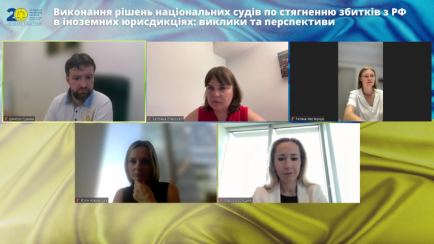Contact center of the Ukrainian Judiciary 044 207-35-46

Following Russia's full-scale invasion of Ukraine, the Supreme Court's reasoning regarding the judicial immunity of the aggressor state in disputes over compensation for damage caused by it has changed. From April 2022, the Civil Cassation Court within the Supreme Court formulated an approach according to which the Russian Federation cannot enjoy judicial immunity in this category of cases (Resolution of the Civil Cassation Court within the Supreme Court of 14 April 2022 in case No. 308/9708/19; for comparison: Resolution of the Civil Cassation Court within the Supreme Court of 13 May 2020 in case No. 711/17/19).
The rationale for this conclusion has also undergone some evolution. One of the problems is that the national court does not know in which foreign jurisdiction the plaintiff intends to enforce the judgment. Therefore, the court is trying to apply various arguments-"exceptions" to the impossibility of using the judicial immunity of the Russian Federation in cases of compensation for damage caused by the defendant's armed aggression in Ukraine. This was pointed out by Judge of the Grand Chamber of the Supreme Court Dmytro Hudyma during an online event on the challenges and prospects of enforcing relevant decisions of Ukrainian courts in foreign jurisdictions.
According to the speaker, the fact that the Russian Federation cannot enjoy judicial immunity in Ukraine in certain cases can be attributed, in particular, to the countermeasures taken by our state in conditions of individual self-defence in accordance with Article 51 of the UN Charter in order to induce the aggressor to fulfil its international obligations (UN General Assembly Resolution No. 56/83 of 12 December 2001 on the Responsibility of States for Internationally Wrongful Acts).
Initially, the Civil Cassation Court within the Supreme Court applied the so-called tort exception, stating that the Russian Federation could not enjoy the relevant immunity in Ukrainian courts because it had exceeded its sovereign rights, denied Ukraine's sovereignty, violated its international legal obligations, waged an aggressive war against our country since 2014, and caused damage.
Since May 2022, the Civil Cassation Court of the Supreme Court has somewhat expanded and improved the reasoning, for example, in the resolution of the Civil Cassation Court within the Supreme Court of 18 May 2022 in case No. 760/17232/20. In addition to the "tort exception" and the argument that the actions of the Russian Federation exceeded its sovereign rights and violated the norms and principles of international law, the Supreme Court also applied the "anti-terrorism exception", stating that maintaining the immunity of the Russian Federation was incompatible with Ukraine's obligations in the field of counter-terrorism.
"It is difficult to predict which of these arguments will be taken into account by a court of a foreign jurisdiction, which of them will be in accordance with the law of a particular foreign state and which will not," the speaker noted.
It should also be borne in mind that it is important for a court of a foreign jurisdiction, which will have to decide on the recognition and enforcement of a Ukrainian court judgment, whether the defendant state has been notified of the proceedings against it. "Despite the fact that there are no diplomatic relations between the countries, it is necessary to find means for such notification," the Supreme Court judge said. He added that it was already a common practice to notify the Russian Federation by posting information about the proceedings on the court's official website. However, this may not be sufficient to enforce the judgment in a particular foreign jurisdiction.
Summing up the results of the discussion, Dmytro Hudyma pointed out that in disputes over compensation for damage caused by the armed aggression of the Russian Federation, the plaintiff should act proactively, being aware of the need to enforce the court decision abroad if the claim is satisfied. What the court cannot do itself, the plaintiff has the right to do. Thus, he may translate the statement of claim, annexes and judgments into Russian and send them, including information on the date, time and place of the hearing, to the official e-mail addresses of the relevant authorities of the Russian Federation. The court can attach the evidence of sending such letters to the case file and describe it in the court decision, so that the foreign court can be sure that the defendant must have been aware of the court proceedings in Ukraine.
In addition, the plaintiff is not prevented from using other means on his/her own initiative to inform the defendant state of the proceedings in Ukraine (e.g. leaving comments with relevant information on the official pages of the Russian authorities in social networks, recording these comments and the web addresses where they were posted, and providing the court with evidence of such notifications to the defendant).
The speaker noted that in considering this category of cases, Ukraine would have to demonstrate the absence of bias and the compliance with other guarantees of a fair trial, in particular allowing the defendant state sufficient time to respond to the claim.
For more information on Dmytro Hudyma's presentation, please visit https://rb.gy/8hd8z.
The event was organized by the Ukrainian Bar Association with the support of the Association for the Development of Judicial Self-Government of Ukraine.